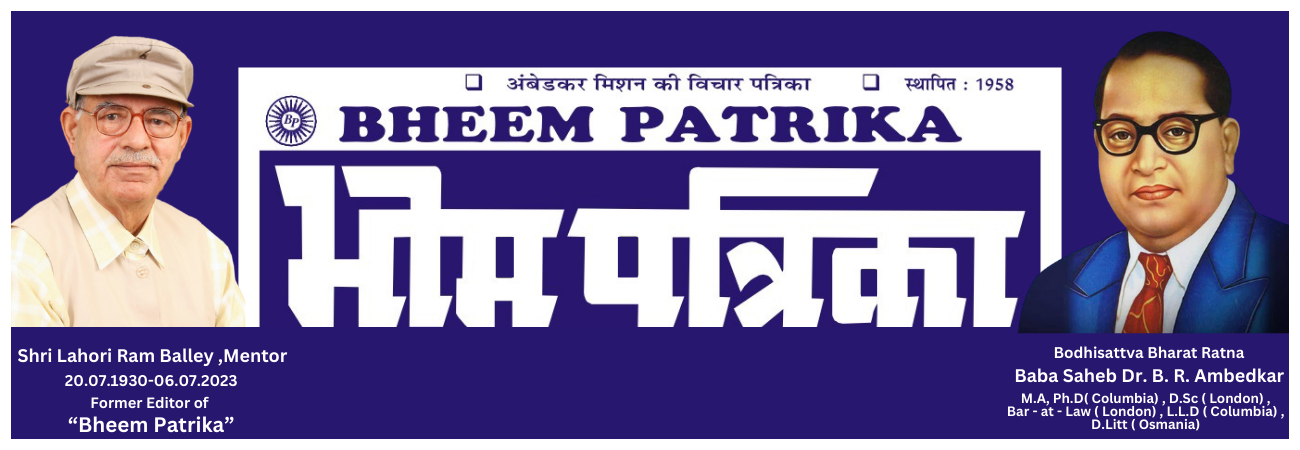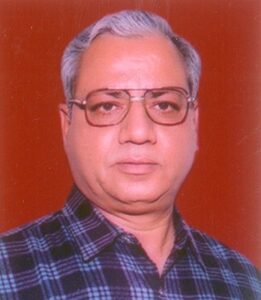

Dr. Surendra Ajnat
Dr. Ambedkar struggled all his life for the betterment of Depressed Classes, now called Scheduled Castes (SCs). He attended Round Table conference in London to achieve his objectives vehemently and argued for the separate electorate for the Depressed Classes.
The upshot came in the form of the British Prime Minister Ramsay Macdonald announcing on August 16,1932, the Communal Award which provided for separate electorate for the Depressed Classes. The award was built on the notion of separate electorate that the British Government had already put in place through the Morley-Minto reforms (1909) and the Montagu -Chelmsford Reforms (1919).
Under the separate electorate system, each community was allocated a number of seats in the legislatures and only the members from these communities would be eligible to vote to elect a representative of the same community to legislate assemblies.
Gandhiji bitterly oppose the Communal Award viewing it as a British attempt to divide the Hindus. He was then in prison. He embarked on a fast unto death to protest against providing separate electorate to the Depressed Classes.
As a result, there was tension and Dr. Ambedkar was under tremendous pressure, to defuse the escalated tensions, negotiations between Gandhi ji and Dr. Ambedkar inevitable.
After the series of negotiations both Gandhi ji and Dr Ambedkar agreed to a solution. On 24 September, 1932 ‘Poona Pact’ was signed at Yerawada Central Jail in Poona by 23 people, excluding Gandhi ji. However, his son Devdas Gandhi did sign. As the pact was signed in Poona, the pact came to be known as Poona Pact.
Dr. Ambedkar agreed to eschew separate electorate. In lieu of that the number of reserved seats was increased, the Communal Award reserved only 71 seats but now the number of seats was almost double that number i.e. 147.
This pact is erroneously called by people as a pact between Gandhi ji and Dr. Ambedkar, whereas the fact of the matter is that it was between upper caste Hindus and Dr. Ambedkar. Gandhiji was not even signatory to the pact as mentioned above. That is why the Hindus observed 8 January 1933 as ‘Temple entry Day’.
The provisions of the pact were incorporated in the government of India Act 1935. In 1937 elections, Dr. Ambedkar fielded 16 candidates out of them 14 won. Under the banner of newly formed party the independent labor Party that was the first occasion when reserved seats as per the Poona Pact were put in practices.
The Poona Pact has changed the Indian political history and the destiny of millions of Dalits across the country. The pact solidified Dr. Ambedkar leadership of the Depressed Classes and made them a formidable political force for the first time in the Indian history.
As earlier mentioned, the provisions of the Poona Pact were incorporated in the Government of India Act 1935, the Constituent Assembly heavily drew upon that act. The reservations for the present day Scheduled Castes (SCs) were taken from the clauses of the pact. It is interesting to know that our constitution borrowed 91 clauses from the government of India Act 1935. In this way, the concessions agreed to in the Poona Pact were the precursors to the Reservations of independent India enjoyed by the Scheduled Castes (SCs).
There are some people who denounce the Poona Pact saying that without the separate electorates it was a forced and lame pact. They are obviously oblivious of the later development that took place in the Constituent Assembly where every section having separate electorates had to relinquish them i.e. the separate electorates. Dr Ambedkar got 147 seats instead of 71 and he had not to eschew that. The Poon Pact proved a veritable springboard for the Scheduled castes (SCs) and we salute to Dr. Ambedkar sagacity for signing the Poona Pact.
हिंदी अनुवाद
पूना पैक्ट और डॉ. अम्बेडकर
डॉ. सुरेंद्र अज्ञात, एमए, पीएचडी
डॉ. अम्बेडकर ने अपना पूरा जीवन दलित वर्गों, जिन्हें अब अनुसूचित जातियाँ कहा जाता है, की भलाई के लिए संघर्ष किया। अपने उद्देश्यों को प्राप्त करने के लिए उन्होंने लंदन में गोलमेज सम्मेलन में भाग लिया और दलित वर्गों के लिए अलग निर्वाचन क्षेत्र के लिए तर्क दिया।
इसका नतीजा ब्रटिश प्रधान मंत्री रामसे मैकडोनाल्ड द्वारा 16 अगस्त, 1932 को सांप्रदायिक पुरस्कार की घोषणा के रूप में सामने आया, जिसमें दलित वर्गों के लिए अलग निर्वाचन क्षेत्र का प्रावधान किया गया था। यह पुरस्कार अलग निर्वाचन क्षेत्र की धारणा पर बनाया गया था जिसे ब्रिटिश सरकार ने मॉर्ले-मिंटो सुधारों (1909) और मोंटेग्यू-चेम्सफोर्ड सुधारों (1919) के माध्यम से पहले ही लागू कर दिया था।
अलग निर्वाचन प्रणाली के तहत, प्रत्येक समुदाय को विधानसभाओं में कई सीटें आवंटित की गईं और केवल इन समुदायों के सदस्य विधानसभाओं के लिए उसी समुदाय के प्रतिनिधि को चुनने के लिए मतदान करने के पात्र होंगे।
गांधीजी ने सांप्रदायिक वार्ड को हिंदुओं को विभाजित करने के ब्रिटिश प्रयास के रूप में देखते हुए इसका कड़ा विरोध किया। तब वह जेल में थे. उन्होंने दलित वर्गों को अलग निर्वाचन क्षेत्र प्रदान करने के विरोध में आमरण अनशन शुरू कर दिया।
परिणामस्वरूप, तनाव हो गया और डॉ. अम्बेडकर पर भारी दबाव था, बढ़े हुए तनाव को कम करने के लिए गांधी जी और डॉ. अम्बेडकर के बीच बातचीत अपरिहार्य थी।
बातचीत के सिलसिले के बाद गांधी जी और डॉ. अम्बेडकर दोनों एक समाधान पर सहमत हुए। 24 सितंबर, 1932 को पूना की यरवदा सेंट्रल जेल में गांधी जी को छोड़कर 23 लोगों ने पूना समझौते पर हस्ताक्षर किये। हालाँकि, उनके बेटे देवदास गांधी ने हस्ताक्षर किए। चूंकि समझौते पर पूना में हस्ताक्षर किए गए थे, इसलिए इस समझौते को पूना पैक्ट के नाम से जाना जाने लगा।
डॉ. अम्बेडकर पृथक निर्वाचन मंडल को त्यागने पर सहमत हुए। इसके बदले में आरक्षित सीटों की संख्या में वृद्धि की गई, सांप्रदायिक वार्ड में केवल 71 सीटें आरक्षित थीं लेकिन अब सीटों की संख्या उस संख्या से लगभग दोगुनी यानी 147 थी।
स समझौते को लोग ग़लती से गांधी जी और डॉ. अम्बेडकर के बीच हुआ समझौता कहते हैं, जबकि सच्चाई यह है कि यह उच्च जाति के हिंदुओं और डॉ. अम्बेडकर के बीच हुआ था। जैसा कि ऊपर बताया गया है, गांधीजी ने समझौते पर हस्ताक्षर भी नहीं किये थे। इसीलिए हिंदुओं ने 8 जनवरी 1933 को ‘मंदिर प्रवेश दिवस’ के रूप में मनाया।
समझौते के प्रावधानों को भारत सरकार अधिनियम 1935 में शामिल किया गया था। 1937 के चुनावों में, डॉ. अम्बेडकर ने 16 उम्मीदवार खड़े किये, जिनमें से 14 जीते। नवगठित पार्टी इंडिपेंडेंट लेबर पार्टी के बैनर तले यह पहला अवसर था जब पूना पैक्ट के अनुसार आरक्षित सीटों को व्यवहार में लाया गया।
पूना पैक्ट ने भारतीय राजनीतिक इतिहास और देश भर के लाखों दलितों की नियति बदल दी है। इस समझौते ने दलित वर्गों के डॉ. अम्बेडकर नेतृत्व को मजबूत किया और उन्हें भारतीय इतिहास में पहली बार एक दुर्जेय राजनीतिक ताकत बना दिया।
जैसा कि पहले उल्लेख किया गया है, पूना संधि के प्रावधानों को भारत सरकार अधिनियम 1935 में शामिल किया गया था, संविधान सभा ने उस अधिनियम पर भारी प्रभाव डाला। वर्तमान अनुसूचित जातियों के लिए आरक्षण समझौते की धाराओं से लिया गया था। यह जानना दिलचस्प है कि हमारे संविधान ने भारत सरकार अधिनियम 1935 से 91 खंड उधार लिए थे। इस तरह, पूना संधि में जिन रियायतों पर सहमति व्यक्त की गई थी, वे स्वतंत्र भारत में अनुसूचित जातियों को मिलने वाले आरक्षण के अग्रदूत थे।
कुछ लोग ऐसे भी हैं जो पूना पैक्ट की निंदा करते हुए कहते हैं कि पृथक निर्वाचिका के बिना यह एक मजबूर और बेकार समझौता था। वे स्पष्ट रूप से संविधान सभा में हुए बाद के विकास से अनभिज्ञ हैं, जहां अलग-अलग निर्वाचन क्षेत्रों वाले प्रत्येक वर्ग को उन्हें यानी अलग निर्वाचन क्षेत्रों को छोड़ना पड़ा। डॉ. अम्बेडकर को 71 की बजाय 147 सीटें मिलीं और उन्हें इससे बचना नहीं था। पूना समझौता अनुसूचित जातियों के लिए एक वास्तविक स्प्रिंगबोर्ड साबित हुआ और पूना समझौते पर हस्ताक्षर करने के लिए हम डॉ. अंबेडकर की दूरदर्शिता को सलाम करते हैं।
>डॉ. सुरेंद्र अज्ञात ने क्रमशः संस्कृत और हिंदी में एम.ए. किया। वह यूनिवर्सिटी गोल्ड मेडलिस्ट हैं और उन्हें डॉक्टर ऑफ फिलॉसफी की उपाधि मिली है। वह शास्त्रों का अच्छा ज्ञाता है। डॉ. अजनात कट्टर तर्कवादी और नास्तिक हैं। डॉ. अज्ञात विभिन्न राष्ट्रीय और अंतर्राष्ट्रीय समाचार पत्रों, पत्रिकाओं और शोध पत्रिकाओं में लेखों का योगदान देते हैं। डॉ अज्ञात. एक कट्टर अम्बेडकरवादी और बुद्ध हैं और उन्होंने डॉ. अम्बेडकर और बौद्ध धर्म पर कई किताबें लिखी हैं। डॉ. अज्ञात एक पूर्व बौद्ध बौद्धिक प्रमुख, समता सैनिक दल (पंजीकृत) हैं
© 2023 – All rights reserved. Created by Digi Adverto